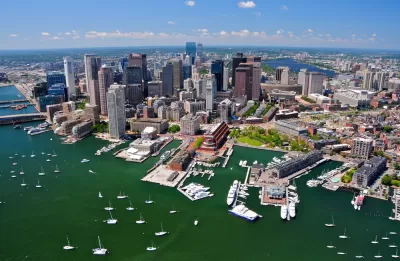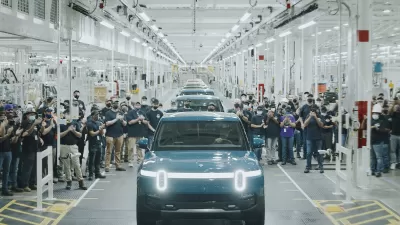The big news about GE moving to Boston is more than just a story about a large company moving from the suburbs to the big city—it's also about how far cities will go to attract new jobs, and at what cost.

"GE got a pretty good deal on their new, Boston home," writes Evan Horowitz.
Although Horowitz mentions Boston's charms—both of location and population—the point here is offer critical analysis of the massive tax breaks the company received to change locations. The details of the deal to bring the company to Boston include, according to Horowitz, "up to $25 million in property tax breaks, as much as $120 million for infrastructure to support the creation of a new corporate campus, and perhaps another $125 million to upgrade nearby roads and bridges."
The article then explains, point-by-point, the policy debate over the effectiveness of luring businesses between states with such lucrative incentives. One of the article's clear messages is not to overplay the importance of this deal to bring 800 employees to a Massachusetts economy that created 6,000 jobs a month in 2015:
Good or bad, though, it’s important to recognize that the GE deal is teeny, a small move in the broader game of economic development. GE’s arrival isn’t to going transform Massachusetts, and the tax incentives will barely make a ripple in the nearly $40 billion state budget.
FULL STORY: Are incentives like those for GE effective in building an economy?

Planetizen Federal Action Tracker
A weekly monitor of how Trump’s orders and actions are impacting planners and planning in America.

Maui's Vacation Rental Debate Turns Ugly
Verbal attacks, misinformation campaigns and fistfights plague a high-stakes debate to convert thousands of vacation rentals into long-term housing.

San Francisco Suspends Traffic Calming Amidst Record Deaths
Citing “a challenging fiscal landscape,” the city will cease the program on the heels of 42 traffic deaths, including 24 pedestrians.

Defunct Pittsburgh Power Plant to Become Residential Tower
A decommissioned steam heat plant will be redeveloped into almost 100 affordable housing units.

Trump Prompts Restructuring of Transportation Research Board in “Unprecedented Overreach”
The TRB has eliminated more than half of its committees including those focused on climate, equity, and cities.

Amtrak Rolls Out New Orleans to Alabama “Mardi Gras” Train
The new service will operate morning and evening departures between Mobile and New Orleans.
Urban Design for Planners 1: Software Tools
This six-course series explores essential urban design concepts using open source software and equips planners with the tools they need to participate fully in the urban design process.
Planning for Universal Design
Learn the tools for implementing Universal Design in planning regulations.
Heyer Gruel & Associates PA
JM Goldson LLC
Custer County Colorado
City of Camden Redevelopment Agency
City of Astoria
Transportation Research & Education Center (TREC) at Portland State University
Jefferson Parish Government
Camden Redevelopment Agency
City of Claremont




























